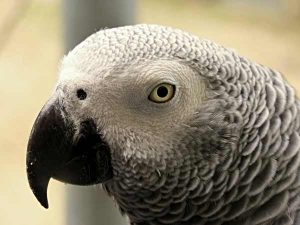Contents
How Our Parrots Adjust to Changes in Personnel
 I’ve been told that many parrots may “glom” onto one person in a family, and then act aggressively toward most of the other humans they encounter. Fortunately, I haven’t had that experience with my birds. Each may have his or her favorites among the various research assistants, but my birds don’t act aggressively toward their non-favorites.
I’ve been told that many parrots may “glom” onto one person in a family, and then act aggressively toward most of the other humans they encounter. Fortunately, I haven’t had that experience with my birds. Each may have his or her favorites among the various research assistants, but my birds don’t act aggressively toward their non-favorites.
An explanation for their behavior may be that, from the time, they enter my lab—usually as chicks— and they have to deal with being handled by at least six or seven people and most often closer to a dozen at any one time. During the school year, each student can work only a limited number of hours/week, and so we have to hire many of them; in the summer, when students can work many more hours, we have a smaller contingent. Our birds learn that people come and go. Such an environment is very different from what a parrot experiences in a private home, where the “flock” is usually very small and consistent. But the experiences in a private home are not normal for a parrot.
Flock Dynamics Constantly Change in the Wild
In the wild, the flock groupings likely change quite a bit on a daily basis and maybe change a lot even throughout the day, with what is technically known as “fission-fusion” behavior—birds travel in small groups of four or five, foraging together, often joining many other small groups at watering holes or particularly rich food sources for parts of the day, then split up again into the smaller groups. Interestingly, we don’t know if the same birds come and leave together. The entire flock, however, does always seem to gather back at the nightly roost.
Some researchers posit that all the evening squawking results from birds “checking in” with one another at dusk. (Ditto for the morning chorus, checking on who made it through the night.) A bird that doesn’t come back to the roost at night is one that has either been the object of predation or has decided to join a separate roost—it isn’t ever coming back. Does this information have any relevance for the home situation and for my lab?
Why Pet Parrots Might Choose Favorites
Although it is not at all clear why, given the usual daily experiences of a wild bird—and our companion birds are only one or two generations away from their wild cousins—a parrot in a family may choose favorites. Maybe, given the abundance of food and water and a permanent roost (their cage), they get “locked” into mating stance, which disrupt some of the behavior described above—the bird that is brooding eggs on a nest clearly doesn’t forage or join the flock at night, but gets fed by its mate, and both birds actively defend the nest site and their mates.
Giving the “Cold Wing”
Usual wild behavior, however may explain why those of my students who leave for summer vacations often get the “cold wing” on their return—the avian equivalent of the “cold shoulder.” One might suppose that our birds have decided that after failing to show up for multiple days, these students are gone for good; our birds definitely are somewhat subdued at the end of the academic year when their human companions disappear, generally never to return.
Maybe the birds go through a bit of a mourning period—all we know is that they tend not to want to work for several days. So, one might then expect them to be overjoyed at the return of a student whom they liked and had thought they had lost forever. And they generally are—but NOT until the student has experienced the “cold wing.”
Sometimes I get the “cold wing” myself when I’ve been gone for more than a few days. The birds do not get all excited and act eager to greet the returning person—they’ll simply look up briefly then IMMEDIATELY go back to what they were doing! That behavior doesn’t last very long—sometimes only a few minutes—but it does seem that the birds want the returning human to understand that something about his or her behavior just was NOT acceptable! Sometimes the birds refuse to work for the returning student for a week or so…giving all the wrong answers, or simply refusing to cooperate.
Although we may be anthropomorphizing our birds’ behavior, that behavior is quite consistent and definitely something we have to take into account when designing experiments and planning our research. Specifically, whether their emotions do indeed mirror ours still needs to be examined, and correlation between events is never good enough to claim causation, but that doesn’t mean that their behavior can be ignored. And I suspect that having this information might be helpful for parrot owners planning on long vacations!





